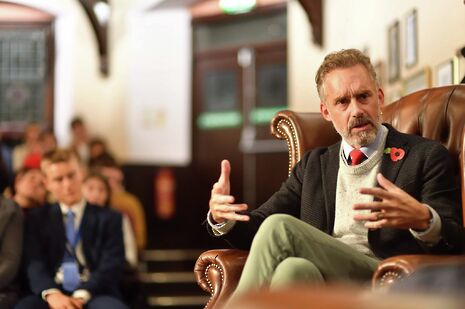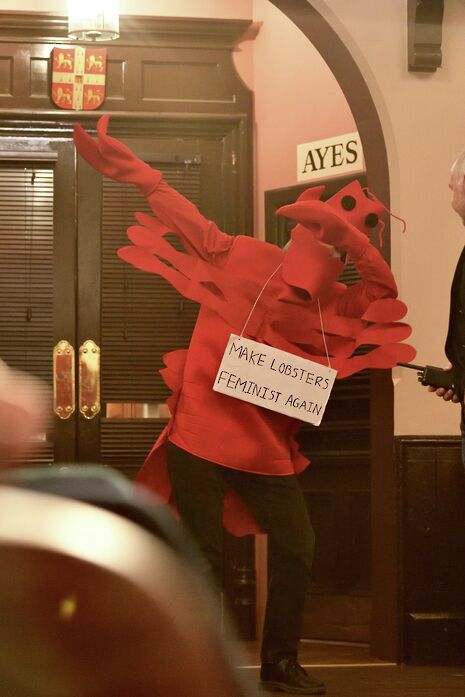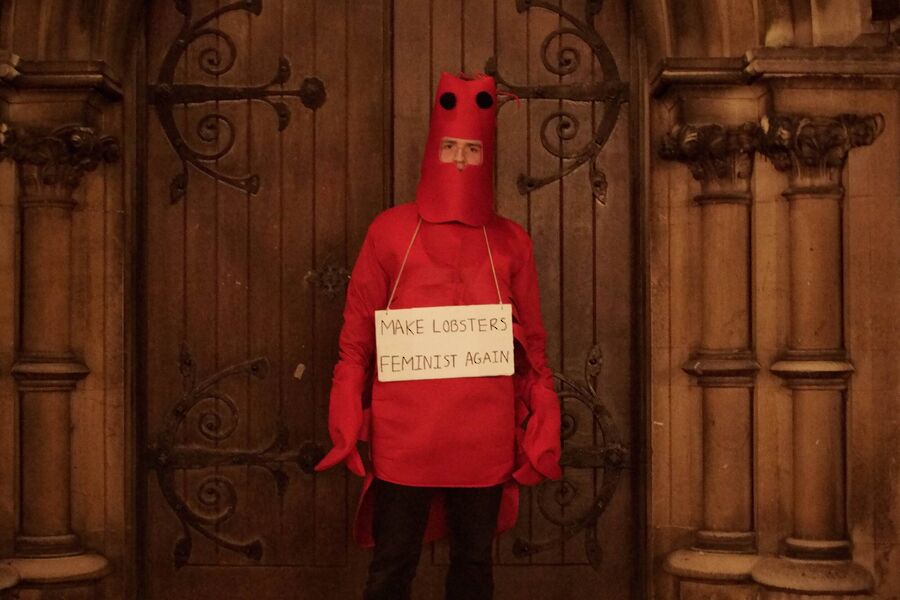Challenging the only ‘partly political’ Jordan Peterson
Niamh Curran speaks to the self-help guru about his controversial views on masculinity, responsibility, and the patriarchy

Before going into a room with Jordan Peterson for an interview, I knew I wasn’t going to ‘win’. I had watched a mountain of previous interviews with him, and his talks, and knew immediately that there was no chance he was going to answer the questions I had for him.
He would simply side-step them, ask for specific definitions of words, behave condescendingly, or completely change the subject. He has become quite adept at this.
So after watching him speak at the Cambridge Union on Friday, to what I thought was a shockingly warm and relatively unquestioning audience, I was ready to at least try to challenge him – and I think I did.
This is a man who courts many objectionable views. He said earlier this year in the New York Times that “the people who hold that our culture is an oppressive patriarchy, they don’t want to admit that the current hierarchy might be predicated on competence”. Last year he tweeted: “With all the accusations of sex assault emerging (eg Louis CK) we are going to soon remember why sex was traditionally enshrined in marriage”, and went on to say that “it’s possible that sex is so dangerous that it has to be encapsulated within a socially-sanctioned construct.”
Got a story for us?
Seen something you think Varsity should be talking about? Contact our News team at news@varsity.co.uk.
He also said in the New York Times, that the ‘incel’ perpetrator of April’s Toronto ‘van attack’ was “angry at God because women were rejecting him”, and “the cure for that is enforced monogamy” – which he later cited as “socially-promoted, culturally-inculcated monogamy”.
His views on gender and biology are particularly contentious. He has previously said:“I don’t recognize another person’s right to determine what pronouns I use to address them. I won’t do it.” To Peterson, ‘chaos’ is represented by femininity, while ‘order’ is masculine. He elaborated on this again in The New York Times. “This is underneath everything. If you change those basic categories, people wouldn’t be human anymore. They’d be something else. They’d be transhuman or something. We wouldn’t be able to talk to these new creatures.”
While speaking at the Union he claimed that he does believe in constructions in gender, but that unlike thinkers like Judith Butler, he thinks it is more related to biology than they would have you believe. Personally I am not totally convinced by either side, but certainly not by Peterson’s – especially as he doesn’t make clear how significant the role of biology is in gender constructions.
This leaves me with a lot of questions. In what ways are gender paradigms constructed or not? Where do sex and gender construction meet? Where does that construction end? These are things he doesn’t properly answer, at least in his speeches. But in leaving that open-ended, it can end up being used as a validation of biological determinism.
This demonstrates the danger in how vague he is. He will make a vast generalisation and then protect himself with phrases like “often” or “in my experience”. So when a critic asks, “how can you say that about all women”, he gets to say “I didn’t”. The misogynist listening to Peterson gets to walk away with their beliefs confirmed by him, and feeling like the argument is won. And this is not to say that everyone who follows him is inherently a misogynist, or as Peterson would say, “not in the least”. It is clear from the jovial, and fairly unchallenging, audience in the Union, (except for one dabbing lobster), that a lot of people like what he has to say. His self-help stuff seems to be certainly helping some people, at least when asking them to clean their rooms, which is not inherently harmful.
However, when his vague speech is political, it is dangerous. In my interview with him it became clear that people can apply whatever view they wish to his political statements, and I think that is why some people have attached themselves to him. His language leaves the door open for an extreme interpretation; yet he claimed at the Union that he wasn’t worried about his work providing an intellectual framework for extreme views. That’s why I was so disappointed by his reception at the Union. Not because of people like him - they are of course allowed to express their views - but because no one really challenged him on what he actually means.
My first port of call were Peterson’s definitions. So frequently in past interviews has he changed the topic by saying, “it depends what you mean by…” Given he sees himself treating people in a crisis of masculinity (and personal crisis), I asked him to define masculinity. His first response was, “well, a huge part of it is a willingness to accept responsibility.” I responded by asking him if that was an exclusively masculine thing, and he said it was not; making it a strange thing to base a conception of masculinity on, if it’s not specific.
Following this we ended up talking about the role infants play in making the rules of personal responsibility different for women compared to men.
“With regards to family, the way it appears to me, especially in the early stages of the development of the family, that a woman’s primary role is to take care of the infant, and the man’s primary role is to take care of the woman while she is taking care of the infant.”
“With regards to family, the way it appears to me, especially in the early stages of the development of the family, that a woman’s primary role is to take care of the infant”
This is both regressive, and appears detrimental to men’s relationships with their children. It certainly seems to go against a push to make men more involved in early child-rearing. When I asked if he thought that men don’t have a role in taking care of their children, he said: “well there’s some role, of course there is, but it’s not as straightforward a matter for a man to take care of an infant.”
“It can happen, but it doesn’t work that well and it’s also generally not the mother of the new infant wants.”
Here again is a sweeping generalisation about another group. In this sense, he seems to define responsibility in different terms when it comes to child-rearing for men and women. So how does this tie into his definition of masculinity? “See, I don’t really think about it that way ... I think about it in terms of how people should act if they are acting properly, acting responsibly, and that works for men and women.”

Here is a problem for me. What does it mean to act “properly” or “responsibly”? When phrased so vaguely, these terms could mean a number of things, but when they lie undefined, are open to abuse in their interpretation. Therein lies the danger.
At least within the family sphere, he applies 1950s solutions to societal problems. In 2017, more than two thirds of women killed by men in England, Northern Ireland, and Wales were killed by a current or former partner – a statistic that did not seem to apply when he wrote on his blog, “anyone serious about decreasing violence against women (or violence in general) might think twice about dismissing the utility of monogamy (and social support for the monogamous tendency) as a means to attain that end.”
To Peterson, the crisis of masculinity is particularly pressing, if ill-defined, as he told me men suffer from a lack of encouragement. “There’s no accusation directed at young women that their desire to move forward in the world is somehow supportive of the tyrannical patriarchy, there’s no question of the utility of their movement forward, it’s partly why they’re doing so well.”
After this I asked him about totalitarianism. It is his belief that if people do not take ‘personal responsibility’, society will be threatened by totalitarianism. He is particularly interested in ‘leftist’ totalitarianism.
He said, “if people don’t take responsibility for what they say and do, then they’re blown in the winds of the current political climate, they have no self of their own to stand-up against.” He continued: “Look, sometimes societies go sideways, we can agree on that I presume; who is going to stand-up against that, when a society goes sideways, if it’s not individuals? And it’s going to be responsible individuals who are willing to speak the truth, so without those people, when society goes sideways there is nothing to stop it.”
“Look, sometimes societies go sideways, we can agree on that I presume; who is going to stand-up against that, when a society goes sideways, if it’s not individuals?”
This is something I find particularly offensive. If we are to take this as a theory of history, then we are led to believe that those who fell victim to leftist, totalitarian regimes were essentially to blame because they didn’t take enough personal responsibility. There were many, many people who stood up to those regimes, from their inception, who did not lose their lives or free will due to lack of personal responsibility.
Moreover, placing a need for individualisation to resist totalitarianism, at the centre of a theory of history is perplexing, given so many totalitarian regimes have depended on isolating groups and portraying them as a scapegoat for society’s ills.
Yet despite these political constructions, he claims what he does is not political. When I brought this up with him, and I said, “everything is political,” things got really heated.
Peterson: “I mean what is it then, why do we have a distinction, why is there politics and philosophy and theology and music and literature and art? Is it because they’re all the same thing?”
Me: “But they have elements of politics within each of them.”
Peterson: “That’s not the same thing as saying they’re the same thing – of course they have interplays between them.”
Me: “But how is saying everything is political saying they are the same thing? That fundamentally doesn’t make sense.”
Peterson: “If you say everything is political then you’ve just defined it.”
Me: “But political isn’t a noun, it’s an adjective.”
Peterson: “Well, you were the one who claimed that everything was political. You didn’t say everything is partly political. There’s a difference between those two statements. Sure, everything is partly political, I’d agree with that, but there is a big difference between partly political and political; there’s a huge difference between those two things. It’s the difference between simplistic thinking and nuanced thinking; it’s the difference between a unitary worldview that collapses everything into one dimension of value, and like a polyphony of conceptual possibilities.”
That is where our interview ended: with an argument over the fact that he wasn’t able to infer that “everything is political” does not mean that everything is the same, with an added dig about my lack of nuanced thinking to boot.
Here Peterson appears deliberately obtuse: while he labels what I call political, only “partly political”, he defines masculinity according to “responsibility” while insisting that responsibility is not a solely masculine trait.
This muddled interaction shows clearly what Peterson does, in my view. There was an attempt to muddy the waters. Yet in going through this, I have had him admit that what he does is political, even if he says, ‘partly political’.
He thinks that sex has more to do with gender than many thinkers will allow. He thinks that he shouldn’t be legally forced to say something if he doesn’t want to. He thinks that there is a post-modern neo-marxist force threatening a totalitarian conspiracy to remold humans to their ideological image. These are inherently political thoughts which allows for the development of ideology, and there is no way he can remove himself from that. By claiming himself as not political, he seems to be trying to protect himself of the implications of what he is saying and hiding behind only being a clinical psychologist.
 News / University Council rescinds University Centre membership20 February 2026
News / University Council rescinds University Centre membership20 February 2026 News / Hundreds of Cambridge academics demand vote on fate of vet course20 February 2026
News / Hundreds of Cambridge academics demand vote on fate of vet course20 February 2026 News / Judge Business School advisor resigns over Epstein and Andrew links18 February 2026
News / Judge Business School advisor resigns over Epstein and Andrew links18 February 2026 News / Caius students fail to pass Pride flag proposal20 February 2026
News / Caius students fail to pass Pride flag proposal20 February 2026 News / Union cancels event with Sri Lankan politician after Tamil societies express ‘profound outrage’20 February 2026
News / Union cancels event with Sri Lankan politician after Tamil societies express ‘profound outrage’20 February 2026










